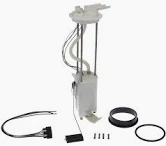A fuel pump can overheat for a number of reasons, the main ones being that it is engineered to work and operate in certain conditions. Fuel pump overheat: A top fuel pumps are the low level of tanks and pushes it towards engine. In many vehicles, the fuel pump is situated inside of the gas tank and operates off of a supply of gasoline to keep it cool while providing lubrication for its moving components. The pump has no fuel solid enough to use as a coolant, and when the tank is below three-quarters full or so there's not much for it even then. During lean running, studies have shown that the lifespan of fuel pump drops by 25%.
Another simple problem is clogged fuel filters that cause the overheating of a spoil offilter pump. The pump will require more current to run, because with a clogged filter the pump has to overcome that and it needs more electrical current in order for this water fuel separation plant work well. The excess current generation causes heat, which may result in early failure. Preemptively replacing the fuel filter every 30-40,000miles(50-64km) should prevent this from happening and ensure optimal functionality of your fuel pump as industry insiders advise on.
Fuel pump overheating due to contaminated fuel If debris or water enters the fuel system, it could cause the pump to start operating poorly which as a result will generate more and heat while struggling trying to deliver fuel at distance pressure. According to a report from the National Highway Traffic Safety Administration (NHTSA), this is not surprising because in about 5% of fuel-related vehicle breakdowns, contaminated petrol leads to more wear and tear on your pump.

Incorrect fuel pump fitting is also a reason for overheating. If pumps are aligned and insulated incorrectly, their operation efficiency is interrupted because the electrical resistance of it increases operating temperatures. If it is properly installed, a fuel pump operates within its normal temperature range which helps increase its life. To be sure, the vast majority of fuel pumps are engineered to work well between 180 and 200 degrees Fahrenheit or so; if temperatures get much hotter than that they can start causing problems for some components.
Rolls-Royce co-founder Henry Royce once said, "the quality will remain long after the price is forgotten." That goes for fuel pumps as well because by using good-quality parts and proper servicing, we can ensure the unit does not overheat or wear out prematurely.
Now, if you are wondering how a fuel pump can overheat - it all boils down to low consumption of the fluid, an accumulation on filters and construction errors. Regularized preventive maintenance like maintaining at least a quarter of the gas in the tank and changing fuel filter to avoid overheating issues, etc. This makes this Fuel Pump ideal for drivers seeking a dependable replacement part with added durability and performance benefits.